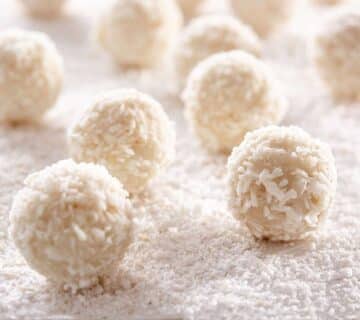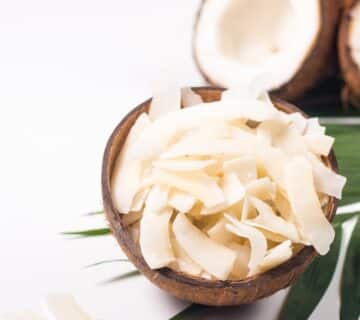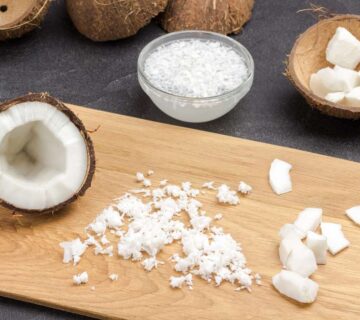Desiccated coconut is a popular ingredient used in various culinary applications, known for its rich coconut flavor and versatility. However, what happens when desiccated coconut reaches its expiration date?
In this article, we’ll explore expired desiccated coconut, understanding on whether it’s safe to consume, how to store it, and creative ways to repurpose it. So, let’s check this out!
9 Factors That Influences Expired Desiccated Coconut
Before we address the specifics of expired desiccated coconut, it’s crucial to understand what expiration dates on food products signify. Typically, an expiration date indicates the last date a product is guaranteed to be at its peak quality and safety. Beyond this date, the product might undergo changes in taste, texture, or even spoil.
When it comes to desiccated coconut, it’s considered a stable and long-lasting ingredient. However, like all food items, it does have a shelf life. The good news is that desiccated coconut can last for quite some time if stored correctly.
Certainly, let’s delve into several factors that can influence the shelf life of desiccated coconut in detail:
1. Packaging Material and Quality
The packaging material plays a pivotal role in determining the shelf life of desiccated coconut. High-quality packaging with a strong moisture barrier, such as vacuum-sealed bags or airtight containers, is essential.
These barriers prevent moisture from entering and ensure the coconut remains dry. Moisture can cause the coconut to clump, develop mold, or become rancid.
2. Light Protection
Exposure to light, especially direct sunlight, can lead to the degradation of the coconut’s natural oils and flavor. Dark or opaque packaging is preferable to shield the coconut from harmful UV rays.
3. Storage Temperature
Temperature control is critical for preserving desiccated coconut. Ideally, store it in a cool, dry place at a temperature of 60°F to 75°F (15°C to 24°C). Fluctuations in temperature can lead to condensation inside the packaging, promoting mold growth and spoilage.
4. Humidity
Desiccated coconut is hygroscopic, meaning it readily absorbs moisture from its surroundings. High humidity levels can lead to clumping, spoilage, and the development of mold. To prolong its shelf life, ensure that the storage area is dry and humidity-controlled.
5. Time Since Production
The shelf life of desiccated coconut often starts ticking from the moment it’s produced, not from the purchase date. When buying, check the packaging for the manufacturing or production date to gauge its freshness.
6. Exposure to Contaminants
Contaminants, such as other food items with strong odors or flavors, can affect the quality of desiccated coconut. Store it away from these types of foods and substances to prevent flavor absorption.
7. Quality of the Coconut Itself
The quality of the coconut used to produce desiccated coconut matters. High-quality coconut processed with care is likely to have a longer shelf life. Conversely, if the coconut used was already compromised or of lower quality, its shelf life may be shorter.
If you are looking for high quality desiccated coconut, you can opt for desiccated coconut from Sari Coconut. They maintain every quality of each product in order to provide maximum satisfaction for customers.
8. Handling and Usage
When handling desiccated coconut, ensure your hands and utensils are clean and dry to prevent introducing moisture and contaminants.
Avoid scooping with wet tools. Using wet tools to scoop the coconut can introduce moisture into the container, leading to clumping and spoilage.
9. Frequency of Opening and Closing
Each time the container is opened, air and moisture have the opportunity to enter. The more frequently it’s opened and exposed to the environment, the shorter its shelf life becomes. Try to minimize opening the container unnecessarily.
Is Expired Desiccated Coconut Safe to Consume?
The key question on whether it’s safe to use expired desiccated coconut is depends. It means the answer depends on several factors, such as:
A. Smell and Appearance
Inspect the coconut. If it has an off-putting odor or shows signs of mold or discoloration, it’s best to discard it.
B. Taste Test
If the coconut still appears fine but has been stored for an extended period, conduct a taste test. If it tastes rancid or stale, it’s time to replace it.
C. Allergies
Individuals with allergies should be cautious when consuming expired coconut, as allergenic properties might become more potent over time.
Creative Uses for Expired Desiccated Coconut
If you have expired desiccated coconut laying around your pantry and it is still in a good condition, you can maximize it by using it in a creative way. Here’s several uses you can try in using expired desiccated coconut:
1. Baking
Expired desiccated coconut can be used in baking. It may have a slightly altered taste, but this can add an interesting twist to your recipes. Consider incorporating it into cookies, cakes, or muffins for a unique flavor profile.
2. Smoothies
Blend expired coconut into your morning smoothies for an extra tropical kick. Its texture may vary, so adjust the quantity to suit your taste.
3. Granola
Create homemade granola by mixing expired desiccated coconut with oats, nuts, and honey. The toasting process can revive its flavor, making it a delightful breakfast option.
4. Curry Topping
Sprinkle expired coconut on curries for added crunch and flavor. The heat from the dish can help mask any alterations in taste.
Do You Have Any Expired Desiccated Coconut?
Expired desiccated coconut doesn’t necessarily need to go to waste. By conducting simple sensory tests and being creative in the kitchen, you can still make the most of this versatile ingredient. Remember to store it properly and keep an eye on the expiration date to ensure safety and quality.
By incorporating desiccated coconut into your meal, you can create various mouth-watering cuisines. To buy desiccated coconut, you can contact Sari Coconut. Sari Coconut is a company that provides a wide range of coconut products including desiccated coconut.
With Sari Coconut, you can enjoy the peace of mind that comes with working with a reliable and professional supplier since they are trusted and offer the finest high-quality products. Go contact Sari Coconut for further concerns regarding coconut products!
FAQ
1. Can I use expired desiccated coconut in savory dishes?
Yes, expired desiccated coconut can enhance the texture and flavor of savory dishes like curries and stir-fries.
2. How long can desiccated coconut last past its expiration date?
When stored correctly, desiccated coconut can remain usable for several months beyond its expiration date.
3. Can I freeze desiccated coconut to extend its shelf life?
Freezing desiccated coconut can indeed prolong its freshness. Divide it into airtight containers and freeze for up to a year.
4. Are there any health risks associated with consuming expired coconut?
While consuming expired desiccated coconut may not pose immediate health risks, it’s essential to be cautious if you have allergies or notice any signs of spoilage.
5. What’s the best way to store desiccated coconut?
Store desiccated coconut in an airtight container in a cool, dry place, away from direct sunlight and moisture for optimal shelf life.






